
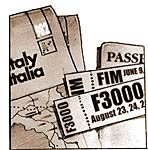
Updates from the Rest of the Racing World
Atlas F1 Magazine Writer
Alex Zanardi Grievously Injured
The collision between the two cars tore completely through the nose of Zanardi's car, causing critical injuries to Zanardi's legs. Medical personnel battled to save Zanardi at the scene, with the Italian being evacuated by helicopter to a hospital in Berlin. Zanardi lost part of both legs and 70% of his blood in the accident, as well as incurring multiple small fractures to the pelvis. It was only through the quick action of CART's dedicated medical emergency team that Zanardi's life was saved.
Now over a week after the accident, Zanardi has been stabilised and is awake and conscious and improving daily. His first concern was for his family, wife Daniella and son Niccolo, and he was very much happy to still be alive.
Zanardi's racing career began when he was runner up in the 1990 Italian Formula 3 championship, moving into Formula 3000 in 1991 where he was a narrow runner-up to Christian Fittipaldi.
Zanardi returned to Formula One, with much fanfare, in 1999, replacing another former CART champion, Jacques Villeneuve, at Williams. The giant of Formula One was in a rebuilding year, still a year before BMW's return to Formula One. Zanardi could not get used to the team or the car. His poor performances were a mystery to all, especially to Zanardi himself.
While we will miss him on the track, we are happy that he is still with us.
Safety Experts to Learn From Zanardi Crash
By Alan Baldwin
Steve Olvey, a founder of the CART medical team, says the Italian's crash will be analysed when the series returns to the United States for any clues to improve car safety. "We reconstruct all of our crashes now that involve an injury," he said at the Rockingham 500 race in central England at the weekend.
"They are very sophisticated computer models that duplicate the crashes so that we can work with different changes in the car and in driver protection areas to prevent injuries in the future."
Zanardi, twice CART champion, was hit by Canadian Alex Tagliani's speeding car after the Italian spun out of the pit lane on to the track at the Lausitzring. Tagliani had no chance of avoiding Zanardi's Honda and the impact at close to 320 kph destroyed the car. Zanardi lost a huge amount of blood and had both legs amputated in hospital.
"This is one of the types of crash that we really fear the most and it's very difficult to protect against something like that," said Olvey. "We are going to look at the side impact and see if there's anything that could be done to make the car safer in that area," added the American. "However you have to realise that it may make it harder on the car that's running into you. You have to do these things in the laboratory and test them."
Olvey's medical team have kept detailed statistics on crashes since 1982 and mirror the work in Formula One carried out by Professor Sid Watkins in advising on safety improvements. CART, with its concrete walls and super-fast methanol-fuelled turbocharged cars, has an image in Europe as being more dangerous than Formula One. The series suffered two driver fatalities in 1999 while Formula One's last was in 1994, when Brazilian triple champion Ayrton Senna and Austrian Roland Ratzenberger died at Imola.
Time was essential in Zanardi's case. German doctors told Olvey that 10 minutes had made the difference between life and death for the Italian, whose femoral arteries were cut. Yet the medical team, helped by the accessibility of an oval track, were on the crash scene and at work within 20 or 30 seconds.
"The priority of CART is safety," said chief executive Joe Heitzler. "Safety is our number one goal. "The trauma centre in Berlin were absolutely taken aback by our extraordinary medical service and of a driver arriving in that condition."
Zanardi's accident highlighted the big danger in CART of a car spinning into the racing line of another travelling at speeds of up to 380 kph. More usual accidents involve the wall, with cars striking glancing blows against the concrete and losing speed gradually or spinning down the banking.
The death two years ago of popular Canadian Greg Moore, who suffered serious head injuries when his car ploughed into a wall and disintegrated after rolling, led to significant change. Like the death of Senna, which sparked the introduction of improved safety measures in Formula One, Moore's accident led to the use of the Head and Neck System (HANS) device on oval circuits.
"Our cars are very safe," said the Canadian driver, who was released from hospital a day after his crash and raced at Rockingham on Saturday. "I had the chance recently to be in a Formula One garage, to see the thickness of the tub and compare it to the thickness of our tub. An incident like that at the same speed in F1 would have been both of us out for sure."
Provided by Reuters
De Ferran At The Last Gasp
When you think of England you tend to think of rainy weather. CART's European foray has been plagued with bad weather. Rain and water seeping through the track saw several practices and qualifying cancelled, and so the cars had to tackle the speedway with few practice laps, gridding up in championship order. The race eventually started in the gathering gloom at 4:45pm, some four hours late. 210 laps had become 168.
At the restart Max Wilson spun, but recovered without hitting a thing and de Ferran and Brack resumed their battle for the lead of the race and the championship. The early laps were run without drama and the front of the field was largely stagnant for the first third of the race. Michel Jourdain Jr spun off at turn 4 on the 50th lap, bringing out the yellows again as the sideways Jourdain almost took out Franchitti and Castroneves. During the yellow period, Newman-Haas misery continued when Christian Fittipaldi's gearbox failed. Once the pits opened, the entire field flooded pitlane. Brack and de Ferran lead the field out with Cristiano da Matta the big mover, up to third.
De Ferran continued to lead into the dying laps, only to come across Brack's teammate Max Papis as Brack started a run on de Ferran. It was a very nervous final lap and a half but de Ferran triumphed. Almost forgotten, Cristiano da Matta made a long awaited return to the podium leading home Castroneves and Andretti. With the four top drivers in the championship finishing in the top five, the title race is still very much on.
Results of FedEx CART World Series, Round 17, Rockingham, Great Britain:
Kenny Brack Wins the American Memorial
"This has been a tough week with the developments in the United States and now the accident with the two drivers," said Brack, "My concern is for both drivers right now. I wish the race could have finished under better circumstances."
The American Memorial, rebadged from the German 500 in remembrance of the events in the United States of America earlier in the week, became a hard fought affair as the cars from Team Rahal, Mo Nunn Racing, Team Penske and Forsythe Racing fought out the race. Since the EuroSpeedway was built, German fans had been waiting for CART to arrive. The FedEx Championship didn't disappoint.
Continuous rain throughout practice meant the cars got minimal laps in practice, but also meant that Michael Andretti was disadvantaged least. Andretti, the last driver to leave the USA, was caught in the aftermath of the terrorist attacks in New York and Washington and didn't arrive in Germany until race morning. With no qualifying completed, the cars would start in championship pointscore order, meaning Andretti would start well up, but it condemned series new boy, Indy Lights front runner Townsend Bell to the rear of the field.
At race start Gil de Ferran was slow from the pole, so Kenny Brack and Michael Andretti pounced to lead the early running, with the two Penskes and the rest of the field strung out behind. The early mover at the front was Dario Franchitti, quickly working his way to second, while further back Tony Kanaan and Alex Zanardi disposed of car after car, proving how well the Mo Nunn cars were travelling. Alex Tagliani was also impressing, up to fifth by lap 30. Franchitti was the first to pit for fuel on lap 33, while the notoriously frugal Lola-Fords of Team Rahal stretched Brack to 38 laps, with Oriol Servia bringing his Lola-Ford in on fumes on lap 40.
With the first round of pit stops completed, Brack led from Patrick Carpentier, Andretti, Tagliani, Franchitti, Kanaan, de Ferran, Helio Castroneves and Servia. The race settled briefly, although Alex Zanardi continued to climb through the order from his lowly 22nd start position to be up to seventh when the yellows came out for the first time. Bruno Junqueira shut the door on Kenny Brack causing Brack to slide and bounce across the grass and almost collect rookie Townsend Bell. With pitstops due within 10 laps the entire field dived for the pit apron.
Brack was back in the lead with Carpentier back into second after Franchitti's engine cried enough. Brack and Carpentier pitted, handing the lead to Andretti who in turn would hand the lead to Takagi and then Junquiera as the last pit stops were completed. Mo Nunn was worried though. Zanardi led the race from Kanaan but a splash'n'dash would be required, so the Mo Nunn cars were pushing hard to build a gap before pitting. Kanaan pitted first, then Zanardi. On his out lap Zanardi was struck by Tagliani after Zanardi spun exiting the pitlane.
The race for the championship has now seen the top four drivers, Brack, de Ferran, Andretti and Castroneves skip clear of the field with a 25 point buffer back to the amazing rookie Scott Dixon. But thoughts were elsewhere and Papis summed it up: "I just want to pray for my friend Alex right now."
Results of FedEx CART World Series, Round 16, Lausitzring, Germany:
Standings (after Rockingham): Kenny Brack 147, Gil de Ferran 141, Michael Andretti 125, Helio Castroneves 123, Cristiano da Matta 92, Dario Franchitti 89, Scott Dixon 86, Patrick Carpentier 83, Tony Kanaan 77, Paul Tracy 76, etc.
Pantano Takes Championship Finale
It would be a dramatic race. The first attempt was aborted after Mark Webber (Super Nova) and Bas Leinders (KTR) stalled their cars on the grid. A second attempt at a start was aborted by Gabriele Lancieri (Durango). From the third start, Antonio Pizzonia (Petrobras) launched away from the field, with Giorgio Pantano getting the jump on Justin Wilson. Pantano rapidly ranged up on Pizzonia's left, who had moved to the right to block Wilson. Pizzonia moved to the left forcing Pantano onto the grass. Somehow Pantano kept his Astromega off the barriers only to be swamped by the field. Further downfield Enrique Tocacello (Astromega) ran out of road trying to get through the Rettifilo chicane and collided with Darren Manning (Arden) and Patrick Friesacher (Red Bull Junior). At the next corner the mayhem continued when former Sauber Formula One driver Noberto Fontana (Prost) nudged Webber and sent the Australian into the barriers. With the track blocked at the Rettifilo the pace car was sent out.
In the end, Justin Wilson convincingly won the Championship through better consistency, having DNFed only once all season compared to Webber's five, and being quicker than teammate Tomas Enge.
Results of International Formula 3000 Championship, Round 12, Monza, Italy:
Final Standings: Justin Wilson 71, Mark Webber 39, Tomas Enge 39, Sebastien Bourdais 26, Ricardo Sperafico 24, Antonio Pizzonia 22, Bas Leinders 17, Ricardo Mauricio 14, Giorgio Pantano 12, David Saelens 10 etc.
Team Standings: Nordic Racing 110, Petrobras Junior Team 46, Super Nova Racing 42, DAMS 26, Red Bull Junior 22, KTR 19, Team Astromega 12, European Minardi 11 etc.
Debut Win For Gibernau
For anyone connected with Suzuki's Grand Prix squad, it has been an incredibly tough year. The reigning world champions have been completely uncompetitive. For Sete Gibernau it's been hard enough being teammate to the world champion, but there have been continual calls for his position as well. In treacherous conditions and difficult tyre choices, Sete Gibernau outrode his illustrious teammate and Pons Honda rider Alex Barros for an inspiring debut victory.
Pole position went to Max Biaggi, a man fighting to keep his world championship hopes alive, but when the rain interrupted proceedings during the 250cc race, Valentino Rossi made a different tyre choice and bolted when the lights went out, rapidly clearing away from the field. In the farcical conditions the rest of the field struggled just to stay upright. Norick Abe and Noriyuki Haga clashed and fell while Loris Capirossi didn't make it to turn two of lap one after having already fallen on the warm-up lap.
Leading the chase to Rossi were Alex Barros, Alex Criville and the two Suzukis. Changes made to the blue bikes had finally turned their form around, and the conditions played to their strengths. Kenny Roberts Jr and Sete Gibernau mixed it up with the two Alexs. Barros initially had an advantage but both he and the suddenly fading Rossi were gathered up and a furious battle erupted. Rossi was on the wrong tyres and continued to slide down the field, Rossi's good news being that Biaggi was at that point nowhere, riding outside the top ten and looking unlikely to improve. Alex Criville reduced the fight to three on lap 7 when he fell on a damp patch trying to deprive Gibernau of second.
The fastest bike of the race at this point was Charlie Checa. He had fallen on the warm-up lap and started from pitlane, but was scything through the field on the spare Marlboro Yamaha at a pace that must have been embarrassing for teammate Biaggi. By lap 10 he attacked and passed Shinya Nakano for fifth and had his sights set on Rossi. Jurgen van de Goorbergh was also flying, taking fastest lap from Checa as the Proton displayed pace it hadn't shown in a long time.
Rossi continued to tumble through the field, with thoughts of being able to put the title beyond the grasp of Biaggi gone as Olivier Jacque went past the yellow Honda which was soon monstered by a pack of Abe, Nakano and van de Goorbergh. Next was Biaggi. It was surreal to see a battle develop between Rossi and Biaggi over tenth. Biaggi took his rival on the second last lap into turn one. At almost exactly the same time Barros left the smallest of gaps, and so Gibernau dived into the hairpin and accelerated away leaving blue paint on the West Honda. Barros spent a desperate lap and a half throwing everything at Gibernau, but the Spaniard held on to take the win. On his cool down lap, he stopped at the hairpin where he took the lead and ran around waving Spanish and American flags, was embraced by teammate Roberts and hoisted aloft by marshals.
Results of World Motorcycle Championship, Round 12, Valencia, Spain:
Burns Win Battle of Britons
Richard Burns claimed his and Subaru's first win of the year at Rally New Zealand. It was an excellent drive by Burns, emphasised by the fact he had to beat the entire field when not a single factory car retired. Once day two started, Burns and compatriot Colin McRae moved to the top of the running order and stayed there.
Colin McRae tried valiantly to haul in Burns early on Leg Three, halving his huge overnight lead, but any challenge disappeared after a spin and a stall on the second last stage, meaning that McRae had to fight to keep the leading Peugeot at bay. Carlos Sainz was fourth, then third, then fourth, then fifth and finally fourth on a somewhat dramatic final day. His Ford Focus was faster early in the day, taking Gronholm's third position before a spin on the final stage dropped him to fifth. Penalties to one of the Pugs lifted the veteran Spaniard to fourth place again. A final stage spin also delayed Francois Delecour, dropping the Frenchman from top ten contention to twelfth.
It was a miserable rally for Mistubishi. All three cars made the finish intact with the only major drama being when Toni Gardemeister broke a gearbox seal on a rock and lost all his gearbox oil, and his gears on Leg 1. Gardemeister and co-driver Paavo Lukander had to push the Lancer for a kilometer into the second service. Freddy Loix spent the entire rally chasing set-up and was generally dissatisfied. Tommi Makinen was short of pace as Solberg came through from behind to snatch the final manufacturers point and leave the five times champion well adrift of the drivers points in eighth. Loix finished eleventh and Gardemeister 15th.
In Group N, Manfred Stohl's Lancer dominated ahead of Gabriel Pozzo's similar car after the Subaru of Cody Crocker crashed out at the end of Leg 2.
Tommi Makinen now has to share the championship lead with Colin McRae, with Burns closing to within nine points of the leaders and a single point ahead of Sainz, with Rovanpera still a chance for Peugeot. There are still a lot of kilometres left in the championship yet before it is decided.
Results of World Rally Championship, Round 10, Rally New Zealand:
Standings: Tommi Makinen and Colin McRae 40, Richard Burns 31, Carlos Sainz 30, Harri Rovanpera 27, Marcus Gronholm 16, Francois Delecour 14, Didier Auriol 11, Petter Solberg and Freddy Loix 9 etc
Manufacturers Standings: Ford 76, Mitsubishi 66, Subaru 46, Peugeot 44, Skoda 15, Hyundai 10
![]() CART
CART
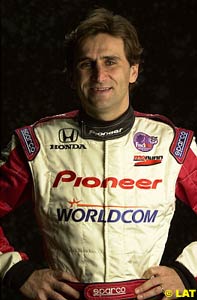 On lap 142 of the German 500, renamed the American Memorial, Alex Zanardi pitted his Mo Nunn Racing Reynard-Honda from the lead having led for the previous 20 laps, being in contention for a race win for the first time since returning to CART at the start of the season. Exiting the pit lane the car broke traction, spinning across a grass strip between pit exit and the race track, ending up on the racing line and directly in the path of Alex Tagliani's Player's/Forsythe Racing Reynard-Ford.
On lap 142 of the German 500, renamed the American Memorial, Alex Zanardi pitted his Mo Nunn Racing Reynard-Honda from the lead having led for the previous 20 laps, being in contention for a race win for the first time since returning to CART at the start of the season. Exiting the pit lane the car broke traction, spinning across a grass strip between pit exit and the race track, ending up on the racing line and directly in the path of Alex Tagliani's Player's/Forsythe Racing Reynard-Ford.
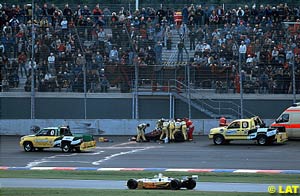 Zanardi was the sensation of the 1996 CART season, scoring three wins and six pole positions for Chip Ganassi and impressed as much with his open and honest friendliness as with his aggressive on track style. He was a huge hit with the fans and a tremendously popular champion the following season in 1997.In 1998 he became only the third driver to take back to back CART titles, breaking the CART points record along the way. In three seasons with Chip Ganassi he scored 15 wins. 2001 was his return to CART after a troubled second attempt at Formula One.
Zanardi was the sensation of the 1996 CART season, scoring three wins and six pole positions for Chip Ganassi and impressed as much with his open and honest friendliness as with his aggressive on track style. He was a huge hit with the fans and a tremendously popular champion the following season in 1997.In 1998 he became only the third driver to take back to back CART titles, breaking the CART points record along the way. In three seasons with Chip Ganassi he scored 15 wins. 2001 was his return to CART after a troubled second attempt at Formula One.
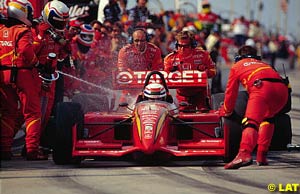 From there he moved to the Jordan Formula One team, replacing Roberto Moreno towards the end of the 1991 season, finishing ninth on debut at the Spanish Grand Prix. Zanardi's Formula One career was sporadic though, racing three races for Minardi in 1992 replacing Christian Fittipaldi while acting as Benetton's test driver. In 1993 he drove for Lotus, scoring his first points, but was injured in a huge accident at Spa-Francorchamps when he hit the wall flat out at Eau Rouge when the car's active suspension failed. Zanardi returned to Lotus in 1994, initially as test driver, before replacing the injured Pedro Lamy. Zanardi raced out the season with Lotus but his Formula One career died with the team.
From there he moved to the Jordan Formula One team, replacing Roberto Moreno towards the end of the 1991 season, finishing ninth on debut at the Spanish Grand Prix. Zanardi's Formula One career was sporadic though, racing three races for Minardi in 1992 replacing Christian Fittipaldi while acting as Benetton's test driver. In 1993 he drove for Lotus, scoring his first points, but was injured in a huge accident at Spa-Francorchamps when he hit the wall flat out at Eau Rouge when the car's active suspension failed. Zanardi returned to Lotus in 1994, initially as test driver, before replacing the injured Pedro Lamy. Zanardi raced out the season with Lotus but his Formula One career died with the team.
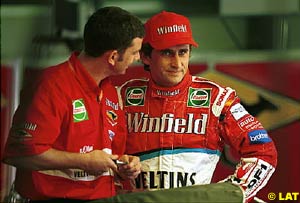 Having fought so hard to get a multi-year contract as a precaution against being dropped due to lack of performance, Zanardi and Williams parted company at the end of the year, and so Zanardi sat out the 2000 season as a paid Williams driver without a car. Zanardi leaped at the chance to be re-united with Morris Nunn, his engineer when he raced with Chip Ganassi in Nunn's own team at the start of the 2001 season. Zanardi struggled early but was a race winning threat at the Lausitzring.
Having fought so hard to get a multi-year contract as a precaution against being dropped due to lack of performance, Zanardi and Williams parted company at the end of the year, and so Zanardi sat out the 2000 season as a paid Williams driver without a car. Zanardi leaped at the chance to be re-united with Morris Nunn, his engineer when he raced with Chip Ganassi in Nunn's own team at the start of the 2001 season. Zanardi struggled early but was a race winning threat at the Lausitzring.
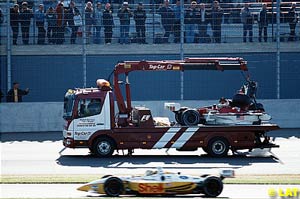 The massive accident that nearly killed Alex Zanardi in Germany a week ago will be repeated again and again - on a computer.
The massive accident that nearly killed Alex Zanardi in Germany a week ago will be repeated again and again - on a computer.
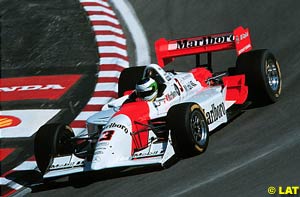 "Alex's was one of the worst types of accidents you can have, because you have a car basically stationary...and it gets hit by another car with a pointed and very strong nose," said Olvey. "The same thing can happen in any open wheel series, the other car doesn't have to be going very fast to penetrate the tub (protective shell) and cause devastating types of injuries."
"Alex's was one of the worst types of accidents you can have, because you have a car basically stationary...and it gets hit by another car with a pointed and very strong nose," said Olvey. "The same thing can happen in any open wheel series, the other car doesn't have to be going very fast to penetrate the tub (protective shell) and cause devastating types of injuries."
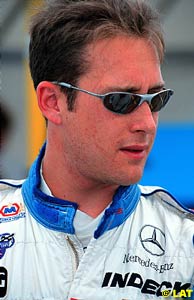 But Olvey said that CART, like Formula One, had learned from its tragedies. "We feel we have the finest medical response team in all sports really," he said. "We've been doing this for over 20 years."
But Olvey said that CART, like Formula One, had learned from its tragedies. "We feel we have the finest medical response team in all sports really," he said. "We've been doing this for over 20 years."
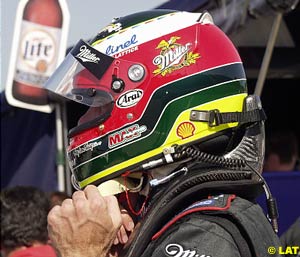 "The biggest change since Greg Moore died was to mandate the use of HANS device on our oval tracks," said Olvey. "As soon as testing was done and we saw how effective it was we made it mandatory." He said that without it, Tagliani would undoubtedly have been knocked unconscious when his car struck Zanardi's.
"The biggest change since Greg Moore died was to mandate the use of HANS device on our oval tracks," said Olvey. "As soon as testing was done and we saw how effective it was we made it mandatory." He said that without it, Tagliani would undoubtedly have been knocked unconscious when his car struck Zanardi's.
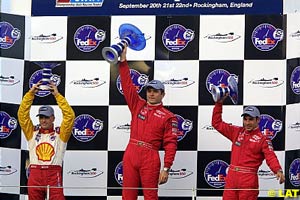 With two laps to go, Gil de Ferran clocked up another lap led. But with a slower car in front, his title rival Kenny Brack swept by into the lead, taking the one-lap-to-go white flag. De Ferran drew alongside Brack, the crowd collectively held their breath as the two white cars went side by side through two turns and to a thunderous reception de Ferran nosed ahead in the dash to the line to win the Rockingham 500.
With two laps to go, Gil de Ferran clocked up another lap led. But with a slower car in front, his title rival Kenny Brack swept by into the lead, taking the one-lap-to-go white flag. De Ferran drew alongside Brack, the crowd collectively held their breath as the two white cars went side by side through two turns and to a thunderous reception de Ferran nosed ahead in the dash to the line to win the Rockingham 500.
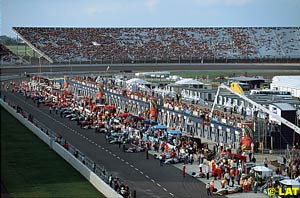 This time it was Brack who was slower away, so de Ferran led the first lap of the Rockingham '400' ahead of Brack, Michael Andretti, Helio Castroneves and Dario Franchitti. The opening lap wasn't completed without dramas as Brack's Team Rahal teammate, Max Papis, spun on the front straight, bringing out the yellows while Jimmy Vasser ran into the back of the slowing Tora Takagi, putting the Japanese driver into the wall. Bruno Junquiera also thumped the wall in the confusion and teammate Memo Gidley spun, but saved the car, saving the Ganassi team an early trip home.
This time it was Brack who was slower away, so de Ferran led the first lap of the Rockingham '400' ahead of Brack, Michael Andretti, Helio Castroneves and Dario Franchitti. The opening lap wasn't completed without dramas as Brack's Team Rahal teammate, Max Papis, spun on the front straight, bringing out the yellows while Jimmy Vasser ran into the back of the slowing Tora Takagi, putting the Japanese driver into the wall. Bruno Junquiera also thumped the wall in the confusion and teammate Memo Gidley spun, but saved the car, saving the Ganassi team an early trip home.
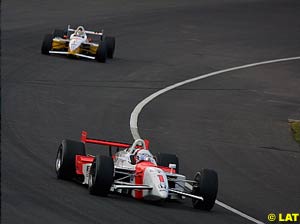 The race again settled until the next yellow period when an engine failure in Adrian Fernandez's car dumped oil on turn 2. As the field were about to pit, CART announced the race would be shortened again to 140 laps due to the fading light. When the Rockingham '330' restarted, de Ferran and Brack again resumed their race long battle. Scott Dixon retired with accident damage, with the team looking daggers towards Oriol Servia in an incident missed by most. Mauricio Gugelmin was black flagged for pit lane speeding, then black flagged again for speeding again when he took the penalty.
The race again settled until the next yellow period when an engine failure in Adrian Fernandez's car dumped oil on turn 2. As the field were about to pit, CART announced the race would be shortened again to 140 laps due to the fading light. When the Rockingham '330' restarted, de Ferran and Brack again resumed their race long battle. Scott Dixon retired with accident damage, with the team looking daggers towards Oriol Servia in an incident missed by most. Mauricio Gugelmin was black flagged for pit lane speeding, then black flagged again for speeding again when he took the penalty.
Pos Driver Car
1. Gil de Ferran Reynard-Honda
2. Kenny Brack Lola-Ford
3. Cristiano da Matta Lola-Toyota
4. Helio Castroneves Reynard-Honda
5. Michael Andretti Reynard-Honda
6. Paul Tracy Reynard-Honda
7. Jimmy Vasser Reynard-Toyota
8. Tony Kanaan Reynard-Honda
9. Dario Franchitti Reynard-Honda
10. Oriol Servia Lola-Ford
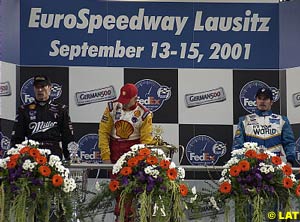 Kenny Brack cruised to lead home Max Papis to a subdued 1-2 victory for Team Rahal in the aftermath of the dreadful accident that befell Alex Zanardi and Alex Tagliani in the race's final stages.
Kenny Brack cruised to lead home Max Papis to a subdued 1-2 victory for Team Rahal in the aftermath of the dreadful accident that befell Alex Zanardi and Alex Tagliani in the race's final stages.
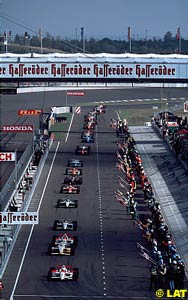 Also making its debut was the new CART-mandated oval wing, replacing the 'Handford Device'. The new wings got rave reviews from the drivers, admiring how much more forgiving the cars were. Before the start the cars drove one lap through Eurospeedway's wide pitlane while the pit crews waved flags in CART's own salute to the events of the previous week back home.
Also making its debut was the new CART-mandated oval wing, replacing the 'Handford Device'. The new wings got rave reviews from the drivers, admiring how much more forgiving the cars were. Before the start the cars drove one lap through Eurospeedway's wide pitlane while the pit crews waved flags in CART's own salute to the events of the previous week back home.
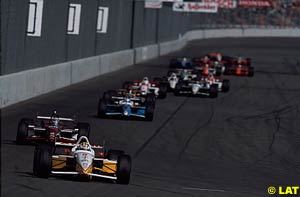 After the restart Carpentier led the field, with Kanaan moving past Brack into second and Zanardi taking Andretti for fourth. Then the yellows were waving again. Tora Takagi had a half lose and drifted out on the wide lightly banked turn but missed the wall, again triggered by Junqueira slamming the door. At the restart, Zanardi took Brack, which started a see-sawing battle between the pair over the next few laps until Zanardi eventually took control. The Mo Nunn duo chased down Carpentier and started a three way fight for the lead. By lap 95 Kanaan led from Zanardi, and Brack was third. Carpentier started sliding down the field, falling victim to teammate Tagliani and Max Papis in rapid succession. Lap 107 and Kanaan pitted, the team telling him "be a money maker", with Zanardi pitting next lap.
After the restart Carpentier led the field, with Kanaan moving past Brack into second and Zanardi taking Andretti for fourth. Then the yellows were waving again. Tora Takagi had a half lose and drifted out on the wide lightly banked turn but missed the wall, again triggered by Junqueira slamming the door. At the restart, Zanardi took Brack, which started a see-sawing battle between the pair over the next few laps until Zanardi eventually took control. The Mo Nunn duo chased down Carpentier and started a three way fight for the lead. By lap 95 Kanaan led from Zanardi, and Brack was third. Carpentier started sliding down the field, falling victim to teammate Tagliani and Max Papis in rapid succession. Lap 107 and Kanaan pitted, the team telling him "be a money maker", with Zanardi pitting next lap.
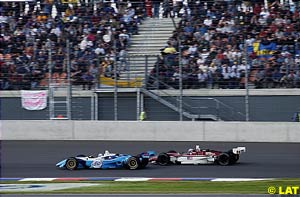 Zanardi was rushed to Berlin hospital while Tagliani was flown to Dresden with a sore back and concussion. The track was covered in carbon fibre debris as the remaining laps were run under yellow flag conditions.
Zanardi was rushed to Berlin hospital while Tagliani was flown to Dresden with a sore back and concussion. The track was covered in carbon fibre debris as the remaining laps were run under yellow flag conditions.
Pos Driver Car
1. Kenny Brack Lola-Ford
2. Max Papis Lola-Ford
3. Patrick Carpentier Reynard-Ford
4. Michael Andretti Reynard-Honda
5. Oriol Servia Lola-Ford
6. Tora Takagi Reynard-Toyota
7. Tony Kanaan Reynard-Honda
8. Gil de Ferran Reynard-Honda
9. Scott Dixon Reynard-Toyota
10. Paul Tracy Reynard-Honda
![]() Formula 3000
Formula 3000
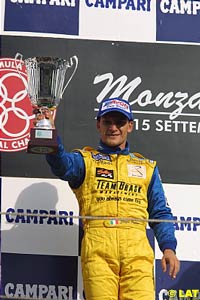 The International Formula 3000 circus arrived in Italy with everything already decided. Justin Wilson was the new champion, Nordic Racing the teams' champion and while Mark Webber and Tomas Enge were tied on points for second, Enge was not racing, substituting for the injured Luciano Burti in the Prost Formula One team. This gave Webber the runner's up position on a countback. There was still a race to be run though, and at Monza no less.
The International Formula 3000 circus arrived in Italy with everything already decided. Justin Wilson was the new champion, Nordic Racing the teams' champion and while Mark Webber and Tomas Enge were tied on points for second, Enge was not racing, substituting for the injured Luciano Burti in the Prost Formula One team. This gave Webber the runner's up position on a countback. There was still a race to be run though, and at Monza no less.
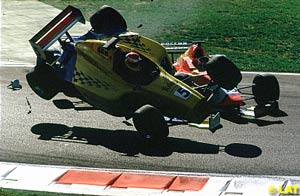 At the restart Wilson blasted past Pizzonia into the lead. Wilson's tyres would not sustain the pace and by mid race distance Pizzonia had retaken the lead. Wilson then fell into the grasp of Pantano, who had stormed through the field after his lap one incident. Pantano wasted little time getting past Wilson, but Pizzonia was too far up the road. Pantano would have the last laugh though when a stop-go penalty was given to Pizzonia for pushing Pantano onto the grass. From that point Pantano had the race under control and took his first Formula 3000 victory at his home circuit. Wilson and Ricardo Sperafico (Petrobras) were secure in the minor podium positions. Further back, a race long battle for fourth was settled in favour of Bas Leinders with Mario Haberfeld (SuperNova) and David Saelens (European) close behind. Haberfeld later had 25 seconds added to his time for cutting the Rettifilo chicane, dropping him to tenth place.
At the restart Wilson blasted past Pizzonia into the lead. Wilson's tyres would not sustain the pace and by mid race distance Pizzonia had retaken the lead. Wilson then fell into the grasp of Pantano, who had stormed through the field after his lap one incident. Pantano wasted little time getting past Wilson, but Pizzonia was too far up the road. Pantano would have the last laugh though when a stop-go penalty was given to Pizzonia for pushing Pantano onto the grass. From that point Pantano had the race under control and took his first Formula 3000 victory at his home circuit. Wilson and Ricardo Sperafico (Petrobras) were secure in the minor podium positions. Further back, a race long battle for fourth was settled in favour of Bas Leinders with Mario Haberfeld (SuperNova) and David Saelens (European) close behind. Haberfeld later had 25 seconds added to his time for cutting the Rettifilo chicane, dropping him to tenth place.
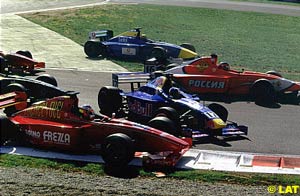 The rest of the field didn't threaten the top three until well into the season. Sebastien Bourdais, Ricardo Sperafico, Antonio Pizzonia and Giorgio Pantano all impressed on their day, and will be four drivers to watch next year if they stay in Formula 3000. The top three will move on, as Webber is already entrenched in Benetton's testing program and rumours connect him to join Sauber in place of Kimi Raikkonen, while Tomas Enge has joined the Prost team in a testing role, and will complete the remainder of the 2001 season at Prost while Luciano Burti recuperates. Wilson has already tested with McLaren and has a Jordan test coming up. While not a stellar year for Formula 3000, it continues to produce Formula One's future.
The rest of the field didn't threaten the top three until well into the season. Sebastien Bourdais, Ricardo Sperafico, Antonio Pizzonia and Giorgio Pantano all impressed on their day, and will be four drivers to watch next year if they stay in Formula 3000. The top three will move on, as Webber is already entrenched in Benetton's testing program and rumours connect him to join Sauber in place of Kimi Raikkonen, while Tomas Enge has joined the Prost team in a testing role, and will complete the remainder of the 2001 season at Prost while Luciano Burti recuperates. Wilson has already tested with McLaren and has a Jordan test coming up. While not a stellar year for Formula 3000, it continues to produce Formula One's future.
Pos Driver Team
1. Giorgio Pantano Team Astromega
2. Justin Wilson Coca-Cola Nordic Racing
3. Ricardo Sperafico Petrobras Junior Team
4. Bas Leinders Keerbergs Transport Racing
5. David Saelens European Minardi
6. Ricardo Mauricio Red Bull Junior Team
7. Marc Goosens Coloni F3000
8. Andrea Piccini European Minardi
9. Sebastien Bourdais DAMS
10. Mario Haberfeld Super Nova
![]() MotoGP
MotoGP
Pos Rider Motorcycle
1. Sete Gibernau Suzuki RGV500
2. Alex Barros Honda NSR500
3. Kenny Roberts Jr Suzuki RGV500
4. Carlos Checa Yamaha YZR500
5. Olivier Jacque Yamaha YZR500
6. Tohru Ukawa Honda NSR500
7. Shinya Nakano Yamaha YZR500
8. Norick Abe Honda NSR500
9. Jurgen van de Goorbergh Proton KR3
10. Max Biaggi Yamaha YZR500
![]() Rally
Rally
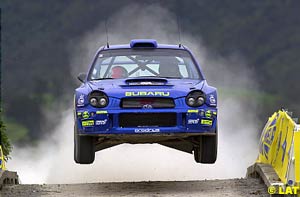 On the first day Burns was steady, ending Leg 1 fifth, far enough downfield that he could use the cars ahead to sweep the roads for him and so he pounced on Leg 2, winning six of the eight stages in a commanding performance. Only Colin McRae and Harri Rovanpera was anywhere near Burns on Leg 2. For Leg 3, it was a matter of damage control as Burns swept the gravel for the rest of the field. Meanwhile Petter Solberg continued to show signs of future promise, with four stage victories on Leg 3 seeing the young Norwegian overhaul Tommi Makinen for seventh place in the rally and picked up an extra manufacturers' point for Subaru. Toshihiro Arai trailed the factory cars in 14th, behind teammate and local legend Peter 'Possum' Bourne.
On the first day Burns was steady, ending Leg 1 fifth, far enough downfield that he could use the cars ahead to sweep the roads for him and so he pounced on Leg 2, winning six of the eight stages in a commanding performance. Only Colin McRae and Harri Rovanpera was anywhere near Burns on Leg 2. For Leg 3, it was a matter of damage control as Burns swept the gravel for the rest of the field. Meanwhile Petter Solberg continued to show signs of future promise, with four stage victories on Leg 3 seeing the young Norwegian overhaul Tommi Makinen for seventh place in the rally and picked up an extra manufacturers' point for Subaru. Toshihiro Arai trailed the factory cars in 14th, behind teammate and local legend Peter 'Possum' Bourne.
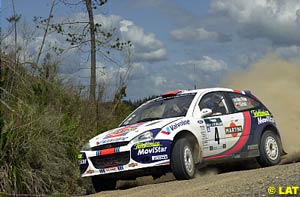 For Peugeot, it was not a great rally. Marcus Gronholm was fast on Leg 3 but the damage had been done by then. Tactical errors cost the team badly on Leg 1, delaying all three cars after times calculated for stages to drop them down the field so they weren't sweeping the roads on Leg 2 turned out to be well off the pace. With the pace of Burns and the two Fords it was time never really made up, although spins by the Fords almost helped them home. Gronholm won several Leg 3 stages to close and pass Sainz and Harri Rovanpera, but the times were very close. When Gronholm was levied a 10 second penalty for a jumped start it dropped him to fifth. Harri Rovanpera then claimed third but rued the time lost on the opening day. Didier Auriol won his own battle just behind this trio. The late charging Solberg and Tommi Makinen fell short of what was required.
For Peugeot, it was not a great rally. Marcus Gronholm was fast on Leg 3 but the damage had been done by then. Tactical errors cost the team badly on Leg 1, delaying all three cars after times calculated for stages to drop them down the field so they weren't sweeping the roads on Leg 2 turned out to be well off the pace. With the pace of Burns and the two Fords it was time never really made up, although spins by the Fords almost helped them home. Gronholm won several Leg 3 stages to close and pass Sainz and Harri Rovanpera, but the times were very close. When Gronholm was levied a 10 second penalty for a jumped start it dropped him to fifth. Harri Rovanpera then claimed third but rued the time lost on the opening day. Didier Auriol won his own battle just behind this trio. The late charging Solberg and Tommi Makinen fell short of what was required.
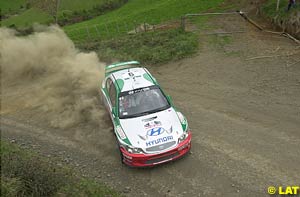 For Hyundai ninth and tenth might not seem like not much reward, but both cars ran reliably and handled well. Kenneth Eriksson suffered on Leg 2 after having been a surprise overnight leader on Leg 1. Sweeping the road for the rest of the Eriksson, and to a lesser extent Alister McRae dropped down the field. For the new team still learning the complexities of WRC cars, perhaps ninth and tenth isn't too bad.
For Hyundai ninth and tenth might not seem like not much reward, but both cars ran reliably and handled well. Kenneth Eriksson suffered on Leg 2 after having been a surprise overnight leader on Leg 1. Sweeping the road for the rest of the Eriksson, and to a lesser extent Alister McRae dropped down the field. For the new team still learning the complexities of WRC cars, perhaps ninth and tenth isn't too bad.
Pos Driver Car
1. Richard Burns Subaru Impreza
2. Colin McRae Ford Focus
3. Harri Rovanpera Peugeot 206
4. Carlos Sainz Ford Focus
5. Marcus Gronholm Peugeot 206
6. Didier Auriol Peugeot 206
7. Petter Solberg Subaru Impreza
8. Tommi Makinen Mitsubishi Lancer
9. Alister McRae Hyundai Accent
10. Kenneth Eriksson Hyundai Accent
![]() Upcoming Events Calendar
Upcoming Events Calendar
Please Contact Us for permission to republish this or any other material from Atlas F1.
|
Volume 7, Issue 39
Atlas F1 Exclusive
Exclusive Interview with Jo Ramirez
Articles
Phil Hill: Made in America
Picture Perfect
United States GP Preview
The United States Grand Prix Preview
Technical Preview: Indianapolis
Columns
Elsewhere in Racing
The US Grand Prix Circuit Trivia Quiz
Bookworm Critique
The Weekly Grapevine
> Homepage |